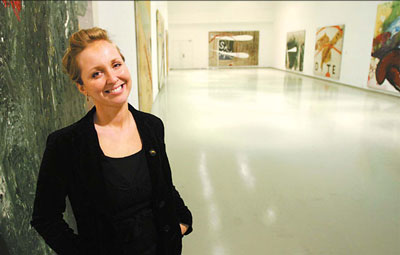Liesbeth Coppens is in her second year in Shanghai sharing her expertise in contemporary Chinese art. Not only does the 1.8 m tall blonde Belgian literally stand out from the crowd, she is also the only foreigner among 39 locals working at Shanghai Zendai Museum of Modern Art.
When she landed the job as curator, Coppens joined an exclusive group of foreigners who, as a profession, help the world understand new Chinese art.
For Coppens, who has a degree in Art History and Cultural Anthropology, moving to Shanghai has proven an ideal way to combine her two interests: art and culture.
"In Belgium, knowledge about contemporary Chinese art was hard to come by, so I was naturally curious before moving to China," Coppens says.
"Also, I knew I wanted to move to a foreign country when I graduated from university. I have always loved to travel and experience new cultures."
Coppens had friends in both Beijing and Shanghai. When she got the chance in March 2005 to work at 198 Artspace, a private gallery in Shanghai's famed Moganshan Road art district, Coppens could hardly believe her luck. Unfortunately, it soon turned out that the commercial approach needed in a gallery was not the way to go for Coppens.
Liesbeth Coppens says her work in Shanghai is an ideal way to satisfy her interests in art and culture. (photo: China Daily)
After nine months in the private art gallery, Coppens decided to move back to Belgium. However, soon after arriving home she realized it had been a mistake to leave China because she still had more to discover.
"I was simply not finished with China," she says.
So Coppens came back to Shanghai. This time she landed her dream job: Project Coordinator at the Curatorial Department of Zendai MoMA. And although Coppens, as the lone Westerner at the museum, is challenged daily on how business is run, she is at ease when she shows China Daily around the large white spaces of the museum.
"I find myself to be a curious person, and I am very fortunate to be here," says Coppens.
Zendai Museum of Modern Art is located in the Zendai Thumb Plaza in the Pudong District of Shanghai. The 3,000 sq m museum building has recently expanded its exhibition space and offices for extra employees.
Zendai MoMA currently exhibits the sculpture piece LOVE by American artist Robert Indiana, as well as works from contemporary Chinese artists.
According to Coppens, the aim is to both help build a native modern arts culture, and to develop a dialogue with the international arts scene.
"At the museum we seek to bring the standard of China's contemporary art academia in line with the country's rate of development," Coppens says.
Last fall, Coppens visited the Asian Contemporary Art Fair in New York City, where she found that the world's focus on Asian art, specifically from China, is increasing. However, Coppens says that much of this interest is hype, which is pushing up art prices.
"Of course I understand why, from a personal perspective, the 25-26 year old Chinese artists who are barely out of school and already selling paintings for $10,000 wish to keep business going," she says.
"At the same time, I do find some of the immense focus on Chinese contemporary art to be more hype than justified interest."
Coppens adds that judging by the catalogues of some young artists, she found that they either repeat themselves or reproduce Western modern art ideals instead of being innovative.
However, while Coppens is critical of some contemporary Chinese art, she remains passionate about the work on display at Zendai MoMA.
One of the projects Coppens is most excited about was launched in Shanghai's cityscape at the beginning of the year.
"We want art to become part of people's everyday life."
Therefore Zendai MoMA has launched the project 366 Days of Artistic Intrusion. During the year-long event, one new artwork or art performance can be found in Shanghai every day.
"Our goal is to make one cultural headline a day," says Coppens about the exhibition's slogan "Making the ordinary extraordinary, the mundane spectacular".
The 366 events will be created by 100 Chinese and 266 international artists or artistic groups, and will involve cooperation with local and international organizations such as the China Academy of Art in Hangzhou, College of Fine Arts of the University of New South Wales in Australia, and Institut pour la Ville-en-Mouvement in France. The Zendai Museum of Modern Art is inviting artists, galleries, museums, curators and performers to participate in the ambitious project.
For Coppens living in a foreign country has proved very different to traveling through it. "I am actively and constantly trying to understand the Chinese," says Coppens who found her work with local colleagues to be enlightening.
"I don't live in the bubble of a typical expatriate life, but on the other hand I am not one of the foreigners here who are always totally pro everything Chinese."
One of the downsides to not living a typical expatriate life is obvious to Coppens when sees other young foreigners at bars and clubs: "These people spend half of my salary on a night out."
"People can't believe that I initially came to China on my own and without a job."
Coppens is used to not fitting in, however she does admit that sometimes she runs a little short on patience.
"Although there is a sweet innocence to it too, some days it does make me feel like a monkey in a zoo when people come up to me to measure how much taller I am than them.
"Getting angry, however, is a waste of time. Because I am a guest in their country, and it is my own choice to be here."
Since Coppens moved to Shanghai, she says her new mantra has become: "Chaos has its own rules."
(China Daily February 1, 2008)


